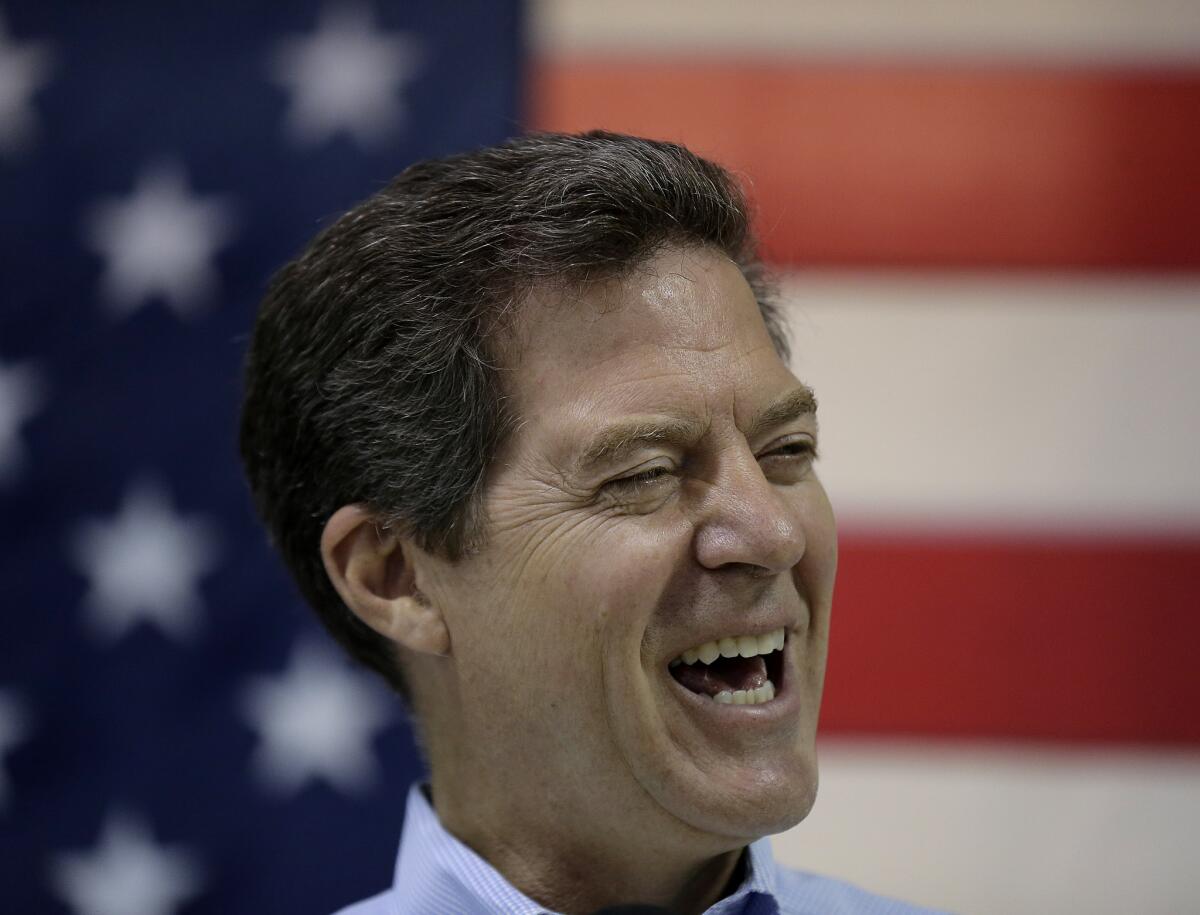A newspaper fact-checks its own right-wing op-ed; hilarity ensues

Kansas Gov. Sam Brownback: With defenders like Stephen Moore, who needs critics?
- Share via
The Kansas City Star probably thought it was on solid ground when it published an op-ed by Stephen Moore defending the draconian, and economically debilitating, tax cuts instituted by Kansas Gov. Sam Brownback. (We reported on how the tax cuts have turned Kansas into a smoking ruin here.)
Moore’s conservative credentials are impeccable: A former member of the Wall Street Journal editorial board, he’s currently chief economist at the Heritage Foundation and a familiar face on Fox News and CNBC. So when his piece asserted that “over the last five years,” the no-income-tax states of Texas and Florida gained jobs while the high-tax states of New York and California lost jobs, the editors waved it through.
Moore punctuated his statistical victory over Brownback’s critics with the ironic refrain “Oops.”
Oops, indeed.
It turns out Moore’s statistics were dead wrong. He later explained that he was citing figures from 2007-2012, not the last five years. But--oops again--he got those figures wrong too. His errors were discovered by Yael T. Abouhalkah, a Star columnist, who took the simple step of cross-checking them against the source, the Bureau of Labor Statistics.
The Star has run a detailed correction. The Heritage Foundation, which also published a version of Moore’s piece, also has run a correction, though not so detailed--it removed the erroneous paragraph and appended a note stating the piece has been “updated to correct an earlier version.”
Let’s see what happened.
Moore’s goal was to strike back at economist Paul Krugman, who described the Kansas experiment as the handiwork of “charlatans and cranks” (among them, Arthur Laffer). Moore argued that Brownback’s tax cuts just need time to work. His key paragraph was this one:
“No-income-tax Texas gained 1 million jobs over the last five years, California, with its 13 percent tax rate, managed to lose jobs. Oops. Florida gained hundreds of thousands of jobs while New York lost jobs. Oops.”
Except that over the last five years--that is, from June 2009 through June 2014, the last month for which BLS has statistics--all four states gained nonfarm jobs. Texas gained the most, 1.26 million, but California was not far behind, with a gain of 1.1 million. Florida’s job gain was 578,000, but New York gained 507,400.
When Abouhalkah questioned the numbers, Moore told the Star that he had actually used BLS figures from December 2007 through December 2012. As the Columbia Journalism Review observes, that’s a misleading choice in itself, since the period spans the recession and therefore incorporates factors such as the housing crash, which affected different states to different degrees.
But Moore’s 2007-2012 numbers are still incorrect. In that period, the BLS says, Texas didn’t gain 1 million jobs, but 497,400. Florida didn’t gain “hundreds of thousands of jobs”--it lost 461,500 jobs. And New York didn’t lose jobs--it gained 75,900 jobs. Yes, California lost jobs, as Moore said. So at least he’s batting .250.
(You can find the 2007-2012 and 2009-2014 numbers in this chart. Abouhalkah followed up his original column here, quoting an email in which Moore expressed regret about the errors but added, “they don’t change the conclusion that the no income tax states have substantially outperformed the high income tax states over every period since about 1970.”)
Moore concluded his column by accusing Krugman of “cherry-picking a few events — the occasional high-tax state that is doing better than average, or a low-tax state that is falling behind — to blur the unmistakable pattern that low taxes (along with light regulation, energy production and right-to-work laws) have become magnets for people and businesses and jobs.” He sneered: “All too typical of liberals.”
But Moore’s effort was worse than cherry-picking--it was akin to trying to pick cherries in an apple orchard. He left himself open to the charge that he didn’t use figures from the last five years, as he claimed, because they would fail to give his point the indisputable support he wished.
Anyway, oops.
Keep up to date with The Economy Hub by following @hiltzikm.
More to Read
Inside the business of entertainment
The Wide Shot brings you news, analysis and insights on everything from streaming wars to production — and what it all means for the future.
You may occasionally receive promotional content from the Los Angeles Times.











